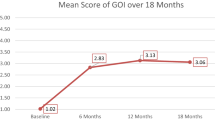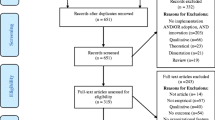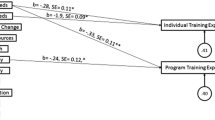Abstract
This paper presents a brief review of organizational measures related to implementation of new practices and technologies in sectors other than mental health, and discusses potential application of these measures to mental health implementation research. A few standardized organizational measures are presented along with considerations regarding the appropriateness of adapting existing measures rather than creating novel ones or using additional methodologies. Challenges and opportunities for researchers in measuring key organizational constructs related to implementation in mental health settings are discussed.
Similar content being viewed by others
References
Burke, W. W., & Litwin, G. H. (1989). A causal model of organizational performance. In J. W. Pfeiffer (Ed.), 1989 annual: Developing human resources. San Diego, CA: University Associates.
Burke, W. W., & Litwin, G. H. (1992). A causal model of organizational performance and change. Journal of Management, 18, 532–545.
Cameron, K. S., & Quinn, R. E. (1999). Diagnosing and changing organizational culture. Reading: Addison-Wesley.
Damanpour, F. (1991). Organizational innovation: A meta-analysis of effects of determinants and moderators. Academy of Management Journal, 34, 555–590.
Davis, H. R., & Salasin, S. (1977). Readiness for organizational change: Decision determinant analysis guide. In I. Davidoff, M. Guttentag, & J. Offutt (Eds.), Evaluating community mental health services: Principles and practice (pp. 14–20). Rockville, MD: National Institute of Mental Health, The Staff College.
Glisson, C. (2002). The organizational context of children’s mental health services. Clinical Child and Family Psychology Review, 5, 233–253.
Glisson, C., & James, L. R. (2002). The cross-level effects of culture and climate in human service teams. Journal of Organizational Behavior, 23, 767–794.
Greenhalgh, T., Glenn, R., Macfarlane, F., Bate, P., & Kyriakidou, O. (2004). Diffusion of innovations in service organizations: Systematic literature review and recommendations for future research. Milbank Quarterly, 82, 581–629.
Hemmelgarn, A. L., Glisson, C., & James, L. R. (2006). Organizational culture and climate: Implications for services and interventions research. Clinical Psychology: Science and Practice, 13, 73–89.
Kimberly, J. R., Counte, M. A., & Dickinson, R. O. (1972). Design for process research on change in medical education. Proceedings: Eleventh annual conference on research in medical education (pp. 26–31). Miami, FL: Florida Association of American Medical Colleges.
Kimberly, J. R. (1976). Issues in the design of longitudinal organizational research. Sociological Methods and Research, 4, 321–342.
Klein, K. J., & Sorra, J. S. (1996). The challenge of innovation implementation. Academy of Management Review, 21, 1055–1080.
Lehman, W. E. K., Greener, J. M., & Simpson, D. (2002). Assessing organizational readiness for change. Journal of Substance Abuse Treatment, 22, 197–209.
Moos, R., Finney, J., & Cronkite, R. (1990). Alcoholism treatment: Context, process, and outcome. New York: Oxford.
Moos, R., & Moos, B. (1998). The staff workplace and the quality and outcome of substance abuse treatment. Journal of Studies on Alcohol, 59, 43–51.
O’Reilly, C. A., Chatman, J., & Caldwell, D. F. (1991). People and organizational culture: A profile comparison approach to assessing person-organization fit. Academy of Management Journal, 34, 487–516.
Pettigrew, A. M., Ferlie, E., & McKee, L. (1992). Shaping strategic change: Making change in large organizations: The case of the National Health Service. London: Sage Publications.
Pettigrew, A. M., Whittington, R., Melin, L., Sanchez-Runde, C., van den Bosch, F. A. J., Ruigrok, W., & Numagami, T. (2003). Innovative forms of organizing: International perspectives. London: Sage.
Poole, M. S., Van de Ven, A. H., Dooley, K., & Holmes, M. (2000). Organization change and innovations processes: Theory and methods for research. New York: Oxford University Press.
Prochaska, J. M., Prochaska, J. O., & Levesque, D. A. (2001). A transtheoretical approach to changing organizations. Administration and Policy in Mental Health, 28, 247–261.
Rosenheck, R. A. (2001). Organizational process: A missing link between research and practice. Psychiatric Services, 52, 1607–1612.
Rousseau, D. (1990). Quantitative assessment of organizational culture: The case for multiple measures. In B. Schnieder (Eds.), Frontiers in industrial and organizational psychology (Vol. 3, pp. 153–192). San Francisco: Jossey-Bass.
Rye, C. B., & Kimberly, J. R. (2007). The adoption of innovations in provider organizations: A multi-disciplinary review. Medical Care Research and Review, 64, 235–278.
Van de Ven, A. H., Angle, H. L., & Poole, M. S. (1989). Research on the management of innovation: The Minnesota studies. New York: Ballinger/Harper & Row.
Van de Ven, A. H., Polley, D., Garud, R., & Venkatraman, S. (1999). The innovation journey. New York: Oxford University Press.
Wasserman, S., & Faust, K. (2005). Social network analysis: Methods and applications. New York, NY: Cambridge University Press.
Zammuto, R. F., Gifford, B. D., & Goodman, E. A. (2000). Managerial ideologies, organization culture, and the outcomes of innovation: A competing values perspective. In N. Ashkanasy, C. Wilderom, & M. Peterson (Eds.), Handbook of organizational culture and climate (pp. 263–280). Thousand Oaks, CA: Sage Publications.
Zammuto, R. F., & Krakower, J. Y. (1991). Quantitative and qualitative studies on organizational culture. Research in Organizational Change and Development, 5, 83–114.
Zammuto, R. F., & O’Conner, E. (1992). Gaining advanced manufacturing technologies’ benefits: The roles of organizational design and culture. Academy of Management Review, 17, 701–728.
Acknowledgements
This study was supported by two National Institute of Mental Health grants to the principal investigator Joan Cook, Ph.D. (R21 MH068565 “Use of Benzodiazepines by Older Primary Care Patients” and K01 MH070859 “Dissemination of Empirically Supported Psychotherapies”).
Author information
Authors and Affiliations
Corresponding author
Rights and permissions
About this article
Cite this article
Kimberly, J., Cook, J.M. Organizational Measurement and the Implementation of Innovations in Mental Health Services. Adm Policy Ment Health 35, 11–20 (2008). https://doi.org/10.1007/s10488-007-0143-x
Received:
Accepted:
Published:
Issue Date:
DOI: https://doi.org/10.1007/s10488-007-0143-x




